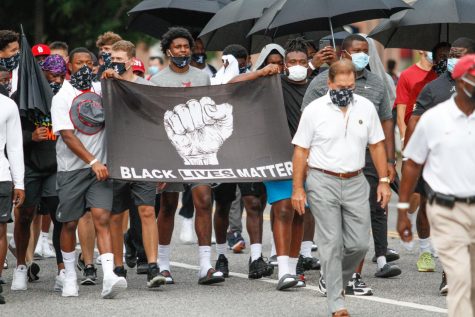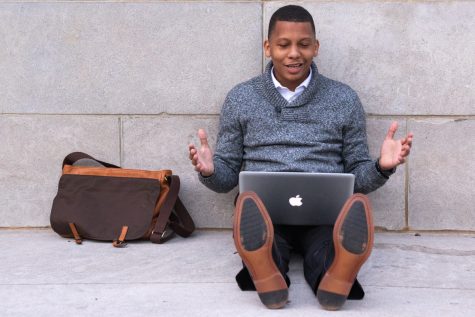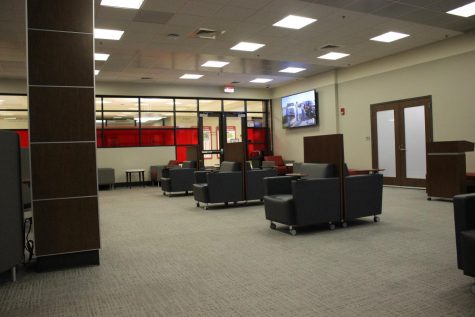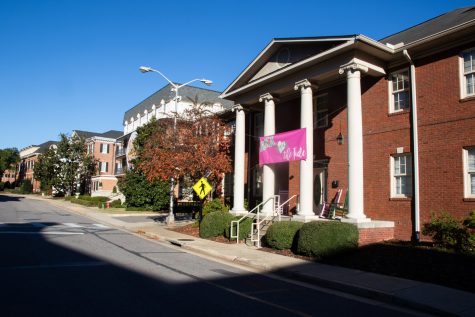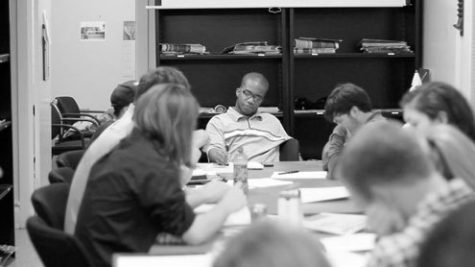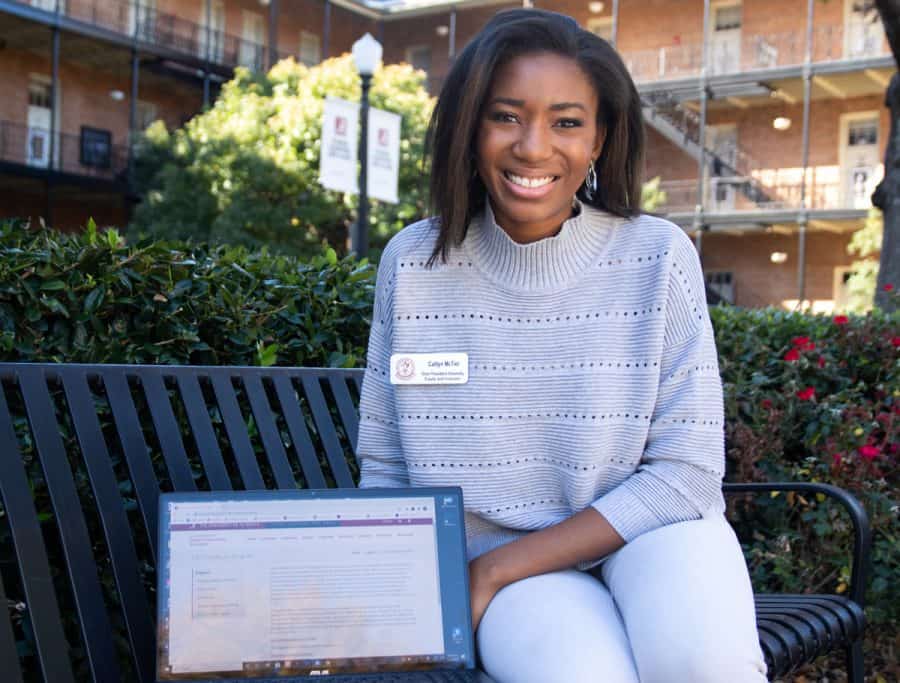‘Much to be done’: How Caitlyn McTier and DEI are trying to make up for lost time
SGA remains largely white and Greek, but McTier, SGA vice president of diversity, equity and inclusion, is still trying to create a space for growth and learning.
Amid renewed national conversations about diversity, equity and inclusion, some members of student government are hoping to repair the organization’s image.
In 2018, The University of Alabama Student Government Association created the vice president’s position for diversity, equity and inclusion (DEI) to better mirror changes in the UA administration. SGA President Demarcus Joiner was the first elected to the position, which he held last year before Caitlyn McTier took over the role this fall.
With her cabinet team of around 25 students, McTier has been working on expanding programming and causing change for the campus community.
“The work that they do is so important,” McTier said. “I think that each of them serve a specific, different subdivision of diversity, which is so unique to our cabinet. So I think for us it’s very special to be able to know that we’re touching almost every single student and their unique background.”
THE CERTIFICATE PROGRAM
One of McTier’s biggest priorities is bolstering the Diversity, Equity and Inclusion Certificate Program, which was a new initiative last year. The program has already expanded this year to include an individual advanced certification option.
“Last year, when the program was created, we had an amazing amount of interest. So I was proud of that, and that’s what I was looking for this year,” Joiner said. “But Caitlyn literally took this program and made it way more than I could imagine.”
The DEI Certificate Program consists of five main events, which take place monthly.
To get certified, organizations with fewer than 200 members must have at least 20% of their members, including at least one executive officer, in attendance at three out of the five events. Organizations with greater than 200 members must have a minimum of 15% of their members, including one executive officer, in attendance at three out of the five events.
The DEI Individual Advanced Certificate Program is more intensive. Individuals must attend at least three out of the five main events, attend at least three other DEI events outside of the program, choose to watch two movies or read one book from approved lists and meet with an assigned partner at least once a month to discuss their different experiences and perspectives.
Following each of the main events, all attendees in both the group and individual certification programs must respond to a survey to prove that they listened and discussed what they learned.
“I believe, knowing that students who are doing the advanced certification are doing it by themselves and not for their organizations, I believe that goes to show that this is not just a trend, but people are actually wanting to do better,” Joiner said.
Along with the new opportunity for individual certification, the DEI Certificate Program has evolved this year to highlight more dimensions of diversity.
From a guest lecture by diversity educator Jane Elliott, to a pledge to normalize asking for preferred gender pronouns, to a panel discussion about the complexity of equality and equity, each event has intentionally given a platform to different experiences, identities and communities.
AN INTERSECTIONAL APPROACH
Aside from the DEI Certificate Program, the cabinet also hosts various other events throughout the year.
Eboné Ivory, a senior majoring in business management and the DEI Cabinet’s director of disability services and relations, said she enjoyed past events, like the multicultural fair and karaoke night. She said they allowed them to create spaces for international students to get involved on campus.
“Those are really fun experiences that we try to create on our campus,” Ivory said. “As well as the DEI Certificate Program, [which has] more serious matters to address and educate our students on different areas in DEI.”
With these events, the cabinet highlights that diversity means more than just race and ethnicity.
“I myself am a student who has a disability, and there really isn’t a space where I feel like I’m heard,” Ivory said. “I very much have to advocate for myself and work with the Office of Disability Services, but there [aren’t] really opportunities for me to meet students who identify and are proud of their disability and want to share and want to embrace who they are.”
Ivory said DEI and SGA have helped to create more of these opportunities for her and allowed her to create those opportunities for others, too.
She said when people think of DEI, they tend to think of specific groups like racial minorities, international students and the LGBTQIA+ community, and, yes, the cabinet does work with those groups, but those aren’t the only groups the cabinet offers support to.
“We also represent veterans who may be struggling from a lack of support from our communities and our country, and then we work a lot with food insecurity and students who may be experiencing different setbacks in their lives,” Ivory said.
She stressed that there are far more ways than one to be diverse.
“I really believe, in one way or another, each of us are a part of a DEI group or category,” Ivory said. “People really need to think about and reflect [on] the things that make them unique and special, and how we as a campus really want to embrace that and celebrate that. So, I think that is the overall goal of our cabinet.”
FAR FROM OVER
Alabama’s student government, with a mostly-white legislative body and historic ties to the Machine, has a racist connotation. And while the cabinet has made meaningful progress since its inception, its members understand that their work is far from over.
One piece of that work is ensuring that university organizations accurately represent the campus community’s diverse experiences.
“Sometimes [university organizations] think that if we have one minority, or one LGBT student or one international student, then that’s diversity, and that’s not true,” McTier said. “So I think that’s been one of my biggest pushes, to make it very clear in the spaces that I serve in that me being there isn’t enough.”
Some students feel this issue also exists within SGA.
“It’s definitely gotten slightly better,” said Alyssa, a junior majoring in marketing who did not want her last name printed. “I’ll see some people of color in the [SGA] office, but I definitely still think it goes into that predominantly white route. I feel like, when people do run for SGA, in a way, it’s kind of like a popularity vote and not what a student can actually bring to the campus.”
Alyssa emphasized the apparent lack of Latinx, Asian and Arab students within SGA, as well as a lack of representation for the entire community of students who aren’t involved in Greek life.
She said it seems the people of color who are visible in SGA tend to be affiliated with Greek life or endorsed by other large organizations; they don’t necessarily represent the experiences of non-Greek students of color.
“I feel like this represents how a lot of people feel,” Alyssa said.
Aleah Brown, a senior double majoring in English and political science and a former member of the SGA DEI Cabinet, said the members of SGA that do represent more diverse groups tend to gravitate toward the DEI Cabinet.
And although that’s a positive for the DEI Cabinet, other SGA branches subsequently lack the same kind of diverse representation.
“In a way, [people of color seem] kind of scared to run [for an SGA position], because they feel that they don’t have that chance to compete against someone that has a higher social presence or organizations backing them,” Alyssa said.
Brown said negative connotations about SGA may be counterintuitive to the organization’s goal of adding more diverse members.
“I feel like, yeah, there’s this huge implication where either people don’t want to get involved, they’re afraid to get involved, or they just think that SGA isn’t really doing anything at all besides just holding a position, and that’s not true either,” Brown said. “People in SGA are doing so much work.”
Brown said some of the progress SGA makes is overlooked because of those negative connotations, like the organization’s complicated history with the Machine and a lack of representation in the past.
There was even discussion about Machine interference in the appointment of the first Vice President of Diversity, Equity and Inclusion.
“Obviously, I feel like those connotations are still present when you look at demographics of who’s in SGA, but I think that’s something we can work past,” Brown said.
While trying to connect with groups who hold negative views of SGA, McTier prides herself on fostering diverse friendships. Through these friendships, she hears different feedback and perspectives, so she can create programming and push for change that truly includes and benefits everyone.
“At the end of the day, it still can be a little difficult to balance, too,” McTier said.
‘LISTENING TO HEAR’
The cabinet has come to realize that even while trying to be intentional and create programming that is fair in its representation of all individuals, there will still be times when controversy arises. Ivory thinks those moments of controversy can sometimes be important gateways to productive conversations.
She described how OneUA week, an event hosted by the Division of Diversity, Equity and Inclusion featuring “A conversation with Jane Elliott focusing on power, perception and prejudice,” led to some backlash.
“Although it may have been crazy hectic in the moment, I think it opened a real dialogue that this campus needs to have,” Ivory said. “[We need] opportunities for people to ask questions, and to have those conversations and to understand how it may make other people feel.”
Brown agreed, noting that, especially now, it’s important that people are being truly heard and that leaders are “listening to hear rather than listening to speak.”
“When people don’t feel heard, they kind of attack, and they kind of lash out,” Brown said. “So, I feel like it’s important to be able to discuss what’s happening in the world right now, and that affects what’s happening on campus and what’s happening in individual lives.”
Above all, Brown said, it’s important to “just be there” for people at this time.
“So many people have questions, and they don’t know how to ask them, or they’re afraid that they’ll offend somebody by asking them,” Brown said. “So it’s learning how to ask questions, right. It’s learning to be open to listen, be open to answer questions because people really want to know.”
Ivory said within both SGA and the campus community as a whole, the DEI Cabinet is creating those spaces where people can ask genuine questions and educate themselves.
“I think especially after all of the events of the summer, we felt an obligation to make sure we were doing more than putting on a virtual event, but doing things that were meaningful,” McTier said. “So, by no means are we perfect and by no means have we absolutely achieved that goal, but something that’s in the forefront of our minds is how do we make sure students are actually impacted and not just watching a video and twiddling their thumbs on their phone when they should be learning something really special and unique to our UA community.”
A HUGE RESPONSIBILITY
McTier referenced responses from the post-event surveys for the DEI Certificate Program as reassuring signs that students are ready and willing to learn.
She said the most interesting responses were from students, usually freshmen, who were exposed to opposing opinions for the first time.
“This is their first time ever hearing about LGBT history; this is their first time ever hearing about race relations from a different perspective,” McTier said. “So it’s always interesting to read through someone’s response and see the aha moment when they realize like, ‘Oh maybe I should reconsider the way that I believed,’ or, ‘I actually am now very invested, and I want to learn more.’”
McTier said that kind of feedback is encouraging but also creates a huge responsibility on her part.
“Now, I’ve got to offer them the opportunities to be able to grow, and offer them tangible solutions to helping them grow in their knowledge of being more diverse and more inclusive,” McTier said.
As a result of the progress the program has yielded, McTier is currently working on getting the DEI Certificate Program added to the SGA Code of Laws, which will make the program mandatory for future vice presidents to hold each year.
However, McTier doesn’t think it’s feasible, as of now, for SGA to make the program mandatory training for all students.
“We still have a very, very long way to go,” McTier said.
She said she’s proud to look back at her last four years here at The University of Alabama and see how much progress has been made each year.
“But then I also have to take a step back, out of my current UA student self, and realize that it took until 2017 for us to start having conversations about needing to have diversity at the forefront of our conversations, and that by itself is problematic alone,” McTier said. “So, I think there is still so much to be done.”
Demarcus Joiner said SGA is in the process of compiling their demographics into a report; currently it has not been completed or published.




